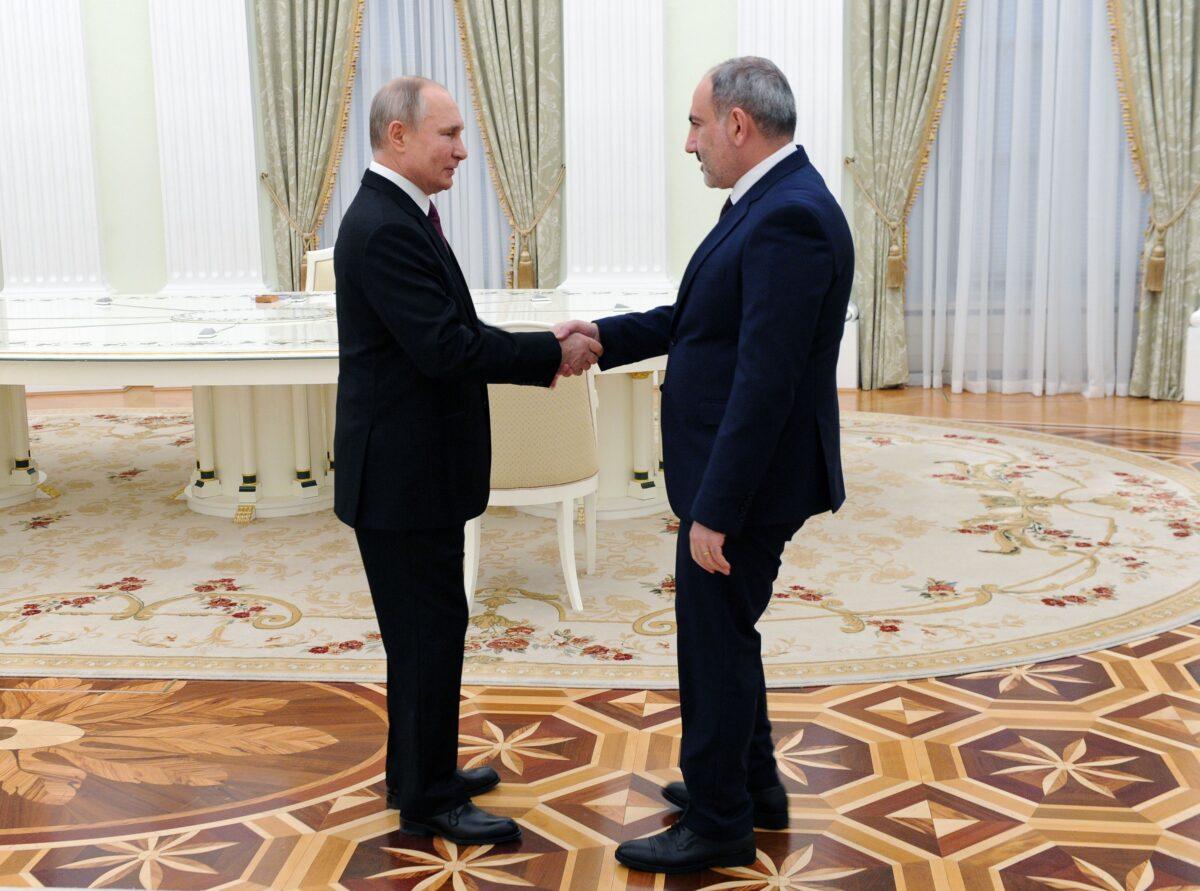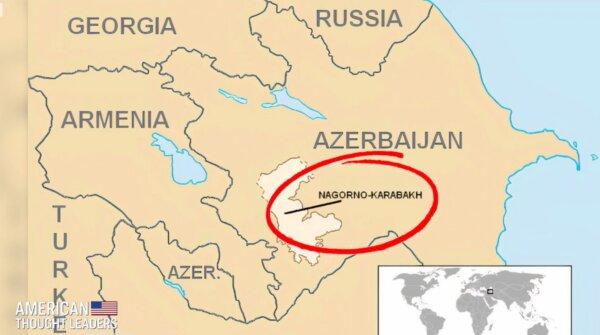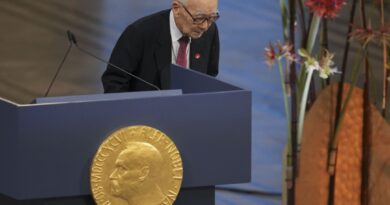Russia Starts Pulling Out Peacekeepers from Conflict Zone in Azerbaijan
Departure coincides with Western efforts to lure Armenia, Azerbaijan’s perennial foe, away from its longstanding alliance with Moscow.
Russian peacekeepers have begun pulling out from Azerbaijan’s Nagorno-Karabakh region after a four-year deployment, according to both Azerbaijani and Russian officials.
“The early withdrawal of Russian peacekeepers … has been decided by the leaders of both countries,” Hikmet Hajiyev, foreign policy adviser to Azerbaijani President Ilham Aliyev, said on April 17.
“The process has already begun,” he was quoted as saying by Azerbaijan’s state news agency.
Mr. Hajiyev added that the Russian and Azerbaijani defense ministries had taken “appropriate measures for the decision’s implementation.”
Viktor Bondarev, deputy head of the Russian Parliament’s security committee, likewise confirmed the withdrawal was underway.
“Peacekeepers have accomplished their mission [in Nagorno-Karabakh], and their return home will bring joy to their families,” Mr. Bondarev said in a social-media post.
He also voiced hope that the conflict over the region, which for decades has pitted Azerbaijan against next-door Armenia, would now be considered closed.
Azerbaijan and Armenia, both former Soviet republics, have remained bitter foes since the collapse of the Soviet Union in the early 1990s.
In 1994, ethnic Armenian separatist groups—backed by Armenia’s military—wrested control of Nagorno-Karabakh, along with adjacent areas.
Since then, Nagorno-Karabakh has been inhabited largely by ethnic Armenians, although the region is internationally recognized as part of Azerbaijan.
In 2020, the two South Caucasus countries fought a six-week war over Nagorno-Karabakh that left hundreds dead on both sides.
With Turkish support, Azerbaijan won the conflict, which ended with a Moscow-brokered ceasefire agreement.
As part of the agreement, Russia deployed a sizeable peacekeeping force to the region, numbering approximately 2,000 troops.
Despite occasional flare-ups, peace was maintained until last September, when Azerbaijan launched a 24-hour offensive into Nagorno-Karabakh to disarm ethnic Armenian separatists and bring the region under its full control.
The offensive, which also ended with a Moscow-brokered ceasefire, prompted tens of thousands of the region’s ethnic Armenians to leave for nearby Armenia.

Armenian Prime Minister Nikol Pashinyan has blamed Russia—and its peacekeeping contingent—for failing to prevent the offensive, despite Armenia’s longstanding membership in the Collective Security Treaty Organization (CSTO).
A six-nation security alliance led by Moscow, the CSTO also includes Belarus, Kazakhstan, Kyrgyzstan, and Tajikistan.
While Azerbaijan is not a CSTO member, it nevertheless enjoys close ties with Russia, which has sought to broker a lasting peace between the perennial enemies.
In February, Mr. Pashinyan announced that his country had effectively suspended its ties with the CSTO.
In remarks to the Western media, he claimed that Russia’s failure to avert Azerbaijan’s offensive had “brought us to a decision that we need to diversify our relationships in the security sphere.”
Moscow has responded to Mr. Pashinyan’s criticisms by noting that Baku’s claim to Nagorno-Karabakh has been internationally recognized—even by Armenian officials.
Russian officials further point out that the CSTO’s mutual defense obligations do not apply to Nagorno-Karabakh, which lies outside Armenian territory.

West Woos Yerevan
Under Mr. Pashinyan, Yerevan, Armenia’s capital, has sought to build closer ties with the Western powers—a policy that has drawn angry reactions from Moscow.
Earlier this month, the Armenian leader met with European Union President Ursula von der Leyen and U.S. Secretary of State Antony Blinken.
Held in Brussels, the meeting served to showcase the deepening ties between Armenia and the West.
“We’re committed to further growing our support for Armenia’s democratic and economic resilience,” Mr. Blinken told reporters after the April 5 meeting.
He also announced plans to increase U.S. financial support for Yerevan—to $65 million this year—with the aim of making Armenia “a strong, independent nation at peace with its neighbors.”
Ms. Von der Leyen, for her part, said the EU and Armenia were “increasingly aligned in values and interest.”
She also stressed the EU’s continued efforts to help enhance Armenia’s security capabilities “to ensure that lethal equipment and technologies do not end up in the hands of the Russian military.”
Ms. Von der Leyen went on to unveil a 270-million-euro ($290 million) financial aid package for Armenia to be dispersed over the next four years.
“Europe and Armenia share a long and common history, and the time has come to write a new chapter,” she said.
At the time, Russia’s foreign ministry called the meeting in Brussels “another attempt by the collective West to drag the South Caucasus into geopolitical confrontation.”
Washington and Brussels, the ministry added: “Are making elusive promises to make Armenia withdraw from the CSTO … and remove the Russian military base [in Armenia] and Russian border guards.”
On April 18, a ministry spokeswoman claimed the United States and the EU were “clearly seeking to cut all ties between Armenia and Russia … and undermine the mechanisms of regional security that are based on the CSTO.”
Reuters contributed to this report.





